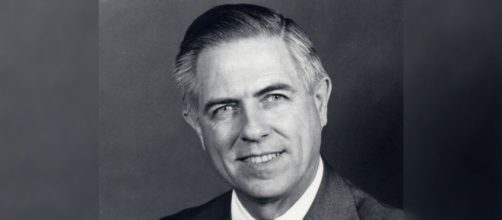The Buckley family would become one of the most influential on American Politics during the 20th Century. With its impact easily reaching into the 21st Century as well. Likely most famously through the political magazine National Review, founded by William F. Buckley Jr..
But only one member of the family has ever really held a high elected office to this point. That distinction belongs to William's brother, James, who had a unique career in his own right. One that can be explored by historians.
Passed away on August 18, 2023
James L. Buckley has died.
His passing came after sustaining injuries at his home in Washington, D.C. Buckley was taken to Sibley Memorial Hospital, where he eventually died.
Earlier this year, Buckley reached his 100th birthday. An occasion that was marked by, among other, the National Review.
In 1965, Buckley managed his brother William's campaign to become mayor of New York City. William, running as a member of the Conservative Party of New York State, finished in a distant third place. Republican U.S. Representative John Lindsay emerged victorious.
For his part, James first ran for the United States Senate three years later, also with the Conservative Party. He also finished in third place, well behind the top two.
Republican incumbent Jacob Javits maintained his seat.
In 1970, Buckley ran again, and this time won in a three-way race. Marking one of the biggest successes for a third-party candidate in American history. In the Senate, Buckley initially supported Republican U.S. President Richard Nixon. But he later called for Nixon's resignation amidst the Watergate scandal.
He also became the lead petitioner in what would become the landmark case Buckley v. Valeo. The United States Supreme Court decision has had a long-last impact on campaign financing.
Buckley's third-party status would eventually change. In 1976, he opted to seek the Republican nomination in his re-election bid. He easily fended off U.S.
Representative Peter A. Peyser in the party primary. But Buckley lost the general election to the Democratic nominee, former diplomat Daniel Patrick Moynihan. Moynihan later chaired the Senate Committees on Finance and on the Environment and Public Works.
Later served as a federal judge
James L. Buckley made another attempt at a U.S. Senate seat in 1980, this time in Connecticut. Again running as a Republican. But he was soundly defeated by Democratic U.S. Representative Christopher Dodd. Dodd went on to chair three Senate committees. After politics, he served as CEO of what is now the Motion Picture Association.
The following year, Buckley was appointed to the U.S. State Department as undersecretary of international security affairs.
In 1982, he very briefly was moved to the role of the department's counselor before departing.
From there, he became president of Radio Free Europe/Radio Liberty. In 1985, Buckley became a federal judge. He was appointed to the U.S. Court of Appeals for the District of Columbia Circuit.
Buckley eventually took on senior status as a judge. Eventually, he retired in 2000.
Was a U.S. Navy officer
James L. Buckley was a native of Manhattan. Growing up, the family's first language was Spanish. Buckley would be educated upstate at the Millbrook School in Stanford. During World War II, he and his brother both became U.S. military officers. William joined the Army, James signed up with the Navy.
As a sailor, Buckley would participate in a number of key engagements.
Including the Battle of Leyte, the Invasion of Lingayen Gulf and the Battle of Okinawa. He would retire from the Navy holding the rank of lieutenant junior grade.
Buckley received a bachelor's degree from Yale University. Followed by an additional degree from Yale Law School. He later would marry Ann Frances Cooley in 1953. They would have six children. Ann died in late 2011.


